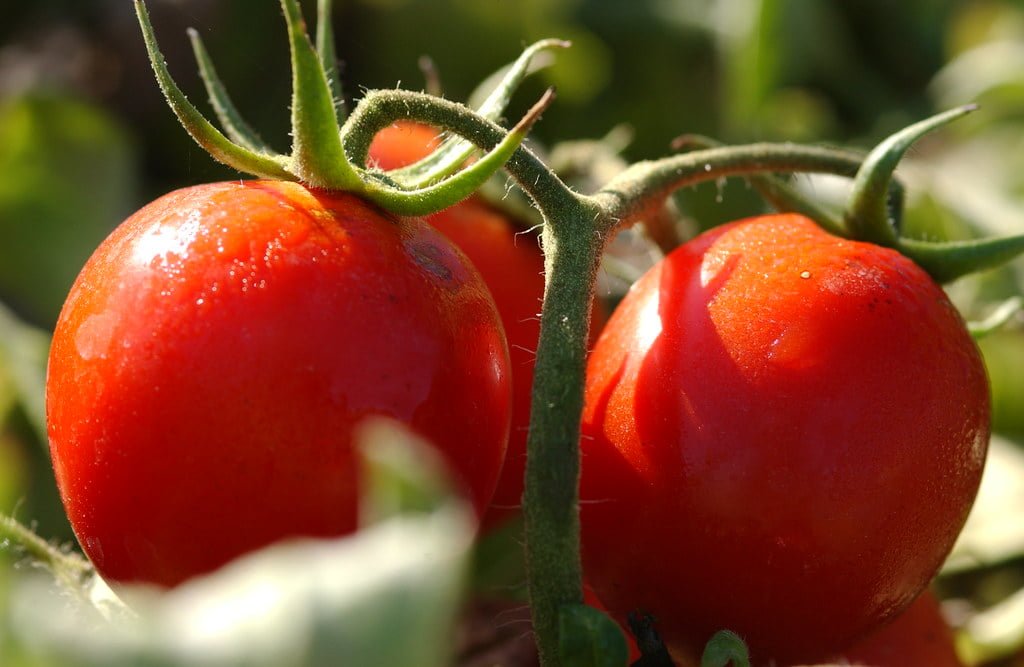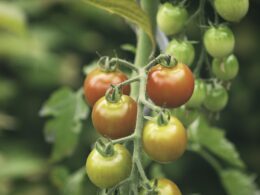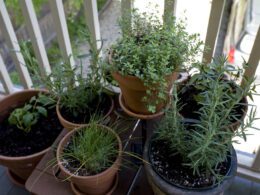You’ve probably heard that coffee grounds can be a great addition to your garden, and you might be wondering if your tomato and pepper plants could benefit from this natural fertilizer. With their high nutrient content, coffee grounds have gained popularity among gardeners as an eco-friendly alternative to chemical fertilizers.
But before you start sprinkling those grounds around your precious plants, let’s dive into the pros and cons of using coffee grounds in your garden.
In this article, we’ll explore the benefits of coffee grounds for tomato and pepper plants as well as some potential drawbacks to keep in mind. We’ll also discuss how to use coffee grounds properly in your garden to ensure that your plants stay healthy and thriving.
And if you’re still unsure about using coffee grounds or simply looking for additional options, we’ll cover some alternative natural fertilizers that can help boost the growth of your tomatoes and peppers.
So grab a cup of joe, sit back, and get ready to learn how you can give new life to those leftover coffee grounds!
Understanding Coffee Grounds as Fertilizer
Now, let’s dive into understanding how coffee grounds can serve as a fertilizer and if they’re suitable for your tomatoes and peppers.
Coffee grounds are known to be rich in nitrogen, which is an essential nutrient for plant growth. Additionally, they contain smaller amounts of phosphorus and potassium, which are also important for healthy plants. When used correctly, coffee grounds can help improve soil structure and provide nutrients that your plants need to thrive.
As you consider using coffee grounds in your garden, remember that moderation is key. Too much of this organic material can lead to issues such as nitrogen toxicity or even inhibit the growth of certain plants due to its acidic nature.
For tomatoes and peppers specifically, it’s best to use well-composted coffee grounds mixed with other organic materials like leaves or grass clippings. This combination creates a balanced environment where your plants will feel safe while receiving the nutrients they need.
To incorporate coffee grounds into your gardening routine, start by spreading a thin layer around the base of your tomato and pepper plants once every few weeks during their growing season. Be careful not to overdo it – less is more when it comes to meeting their nutritional needs!
By doing so, you’ll be providing a natural source of essential nutrients that will support strong growth while keeping safety at the forefront of your gardening practices. So go ahead and give those leftover coffee grounds a new purpose – both you and your plants will reap the benefits!
Benefits of Coffee Grounds for Tomato and Pepper Plants
Imagine supercharging your tomato and pepper plants with an eco-friendly, nutrient-packed secret ingredient – that’s the magic of coffee grounds! Not only do they provide essential nutrients like nitrogen, potassium, and phosphorus for healthy plant growth, but they also improve soil structure and attract beneficial microorganisms. Plus, you’re giving used coffee grounds a new purpose instead of sending them to the landfill.
Some benefits of using coffee grounds in your garden include:
- Boosting nitrogen levels in the soil
- Enhancing soil drainage and aeration
- Providing extra organic matter to improve soil structure
- Attracting earthworms and other beneficial organisms
- Suppressing fungal diseases such as Fusarium wilt
So go ahead and give your tomato and pepper plants a helping hand by adding spent coffee grounds to their growing environment. Simply spread a thin layer around the base of each plant or mix it into the topsoil. The added nutritional value will help your plants produce more robust fruit while improving overall plant health.
And since you’re reusing something that would otherwise end up in the trash, you’ll be contributing to a cleaner planet for everyone – talk about a win-win situation!
Potential Drawbacks of Using Coffee Grounds
You might be considering using coffee grounds in your garden, but there are some potential drawbacks to keep in mind.
Over-acidity concerns can arise, harming your plants if not balanced out properly.
Additionally, coffee grounds could attract unwanted pests like insects or rodents, which could cause damage to your garden.
Over-acidity Concerns
While it’s true that adding coffee grounds to your soil can increase acidity levels, there’s no need for concern when it comes to cultivating tomatoes and peppers. These plants actually prefer slightly acidic soil, with a pH level between 6.0 and 6.8. Coffee grounds can help maintain this preferred pH range by slowly releasing their acidity over time, which means your tomatoes and peppers will be happy campers in their coffee-enhanced environment.
However, it’s essential not to go overboard with the coffee grounds. Too much of a good thing could lead to overly acidic soil, potentially harming your plants instead of helping them thrive. To keep things balanced and safe for your plants, start by adding only small amounts of used coffee grounds at a time – about half an inch layer on top of the soil should do the trick – and monitor how they affect your garden’s overall health.
This way, you’re providing the best possible growing conditions for your tomatoes and peppers while also ensuring their safety from potential harm.
Attracting Unwanted Pests
In your garden, adding coffee grounds might inadvertently attract unwanted pests, creating a less-than-ideal environment for your plants to grow. While tomatoes and peppers may benefit from the nutrients in coffee grounds, you should be cautious about potential negative consequences.
-
Slugs and snails are notorious for being attracted to coffee grounds, and they can quickly destroy your delicate tomato and pepper plants.
-
Ants might also become an issue in your garden if they find the coffee grounds appealing – their presence can disrupt the natural balance of insects needed for healthy plant growth.
-
Rodents such as rats or mice could also be drawn to the smell of used coffee grounds, leading to even bigger problems in your garden.
-
Mold and fungus can develop on damp coffee grounds which could then spread onto your plants, causing diseases that may inhibit growth or even kill them.
-
Unwanted weeds may thrive if you’re not careful with how much and where you apply the coffee grounds.
To keep these unwelcome visitors at bay while still providing essential nutrients for your tomatoes and peppers, consider applying other organic matter like compost or well-aged manure instead.
Your subconscious desire for safety will thank you when you protect your precious garden from these harmful pests.
How to Properly Use Coffee Grounds in Your Garden
Ready to give your garden a caffeine boost? You can enhance your plants’ growth by utilizing coffee grounds. You can do this by composting them or applying as mulch or top dressing.
Let’s dive into these methods for properly using those nutrient-rich coffee grounds in your garden!
Composting Coffee Grounds
You might’ve wondered about composting coffee grounds and their effects on your garden plants, so let’s dive into it! Composting coffee grounds is an excellent way to recycle waste while providing essential nutrients for your tomato and pepper plants.
But before you start sprinkling those leftover grounds in your garden, there are a few things you should know.
- Coffee Grounds’ Nutrients:
- Nitrogen: Coffee grounds are rich in nitrogen, which promotes healthy leaf growth for tomatoes and peppers.
- Phosphorus: This nutrient aids in the development of strong roots, stems, and flowers.
- Potassium: Essential for overall plant health by improving resistance to diseases and pests.
Take caution when using coffee grounds as a fertilizer; too much can raise the acidity level of your soil. It’s best to mix them with other organic materials like leaves or grass clippings in your compost pile before adding it to your garden beds.
Be sure to keep an eye on the pH levels of your soil, aiming for a neutral balance (around pH 6.5-7) that both tomatoes and peppers will thrive in. Your plants will thank you with abundant produce while benefiting from this eco-friendly approach!
Applying as Mulch or Top Dressing
In the previous subtopic, we discussed the benefits of composting coffee grounds for your garden. Now let’s dive into another way you can use coffee grounds to benefit your tomato and pepper plants – applying them as mulch or top dressing.
Applying coffee grounds directly onto the soil surface around your tomatoes and peppers can act as a protective layer or mulch that helps retain moisture, suppress weeds, and regulate soil temperature. Coffee grounds are also rich in nitrogen, which is an essential nutrient for these plants’ growth. To create a visual image of how to apply coffee grounds effectively, refer to the table below:
| Step | Instructions |
|---|---|
| 1 | Collect used coffee grounds from your home or local cafe. |
| 2 | Spread a thin layer (1/2 inch) of coffee grounds around the base of each plant. |
| 3 | Make sure not to pile up against the stem; keep it at least an inch away to prevent rot issues. |
| 4 | Water the area well after application to help nutrients penetrate into the soil. |
By following these simple steps, you’ll provide a safe haven for your tomato and pepper plants by giving them much-needed nutrients while protecting them from potential harm caused by pests and weeds. So go ahead and treat your garden with some caffeine – it may just be what those thirsty plants need!
Can Coffee Grounds and Banana Peels Benefit Tomato and Pepper Plants?
Yes, you can put banana peeling in water to create a natural fertilizer for tomato and pepper plants. When mixed with coffee grounds, this organic concoction can enrich the soil with essential nutrients, promote healthy growth, and enhance fruit production. Embracing sustainable gardening practices can yield impressive results.
Alternative Natural Fertilizers for Tomato and Pepper Plants
Looking for other natural fertilizers to give your tomato and pepper plants a boost? There are several alternatives you can try that are both eco-friendly and effective. By using these natural fertilizers, not only will you be providing essential nutrients to your plants, but you’ll also be promoting a safe and healthy environment for them to grow in.
One great option is using compost or well-rotted manure, which provides an excellent source of organic matter and nutrients such as nitrogen, phosphorus, and potassium. Simply mix the compost or manure into the soil around your plants or use it as a top dressing.
Another option is to create your own liquid fertilizer by steeping compost or aged manure in water for a few days, then straining out the solids. This ‘compost tea’ can be applied directly to your plant’s roots or used as a foliar spray.
Another alternative is utilizing worm castings from vermicomposting (a process where worms break down organic material). Worm castings provide valuable nutrients like nitrogen and trace minerals that help promote strong root growth and overall plant health. To incorporate worm castings into your garden, simply mix them with the soil around your plants during planting or sprinkle them on top of the soil throughout the growing season.
Whichever natural fertilizer method you choose, keep in mind that consistency is key – regular applications will ensure that your tomato and pepper plants receive all the necessary nutrients they need to thrive safely.
Conclusion
So, do tomatoes and peppers like coffee grounds? Absolutely! Coffee grounds provide essential nutrients these plants crave, while also helping to improve soil structure.
Just remember to use them wisely – don’t overdo it and consider mixing in other natural fertilizers for a well-rounded diet.
In the end, your tomato and pepper plants will thank you for giving them a boost with coffee grounds. Experiment with this eco-friendly fertilizer and watch your garden flourish!









